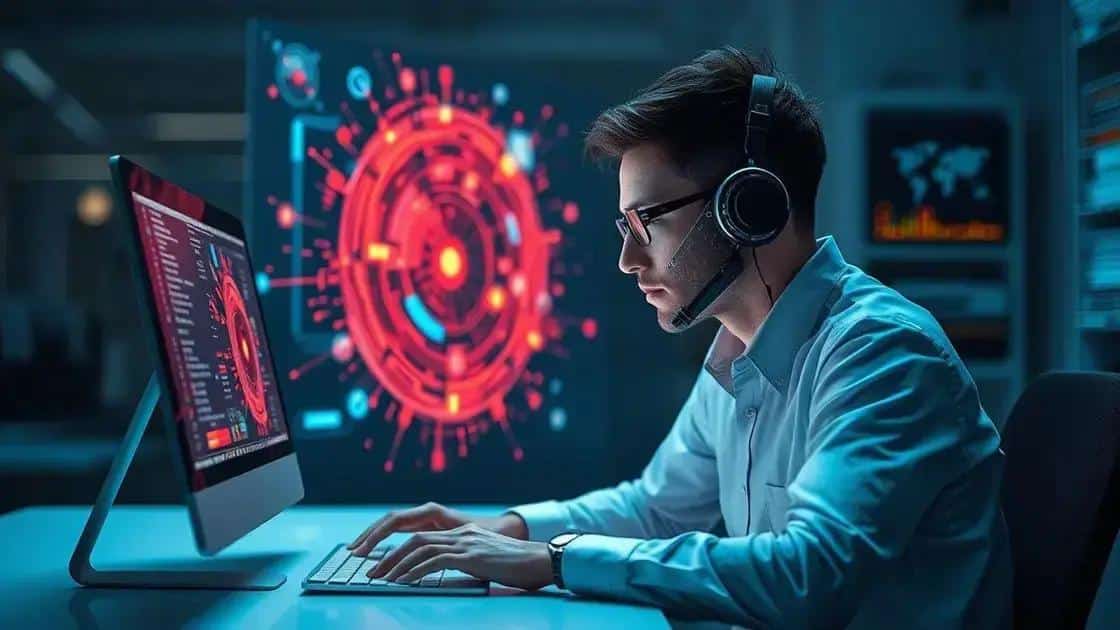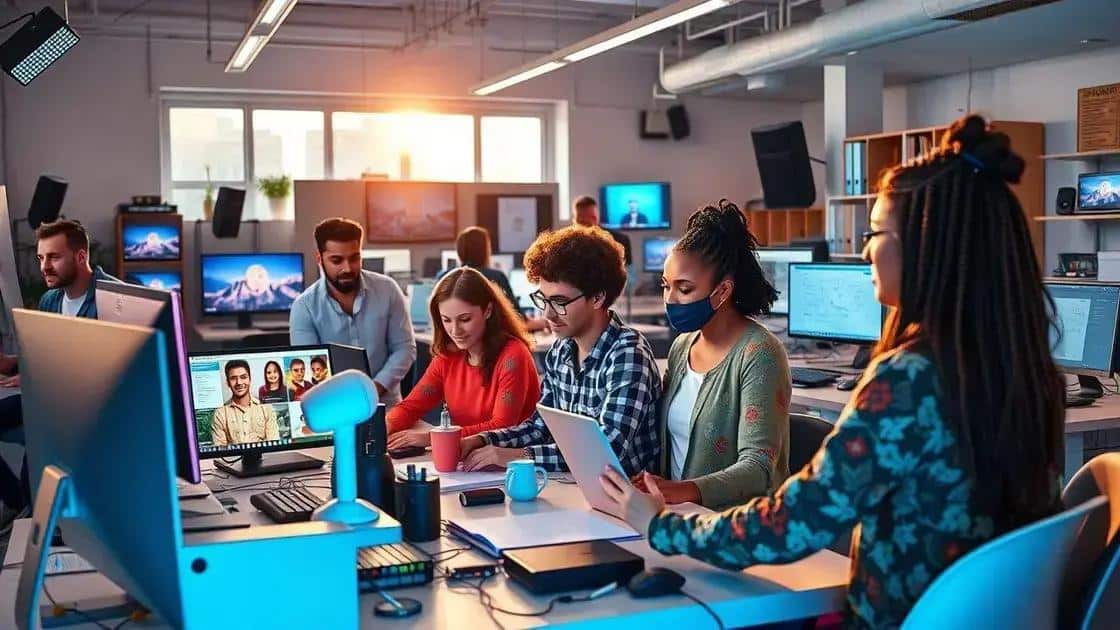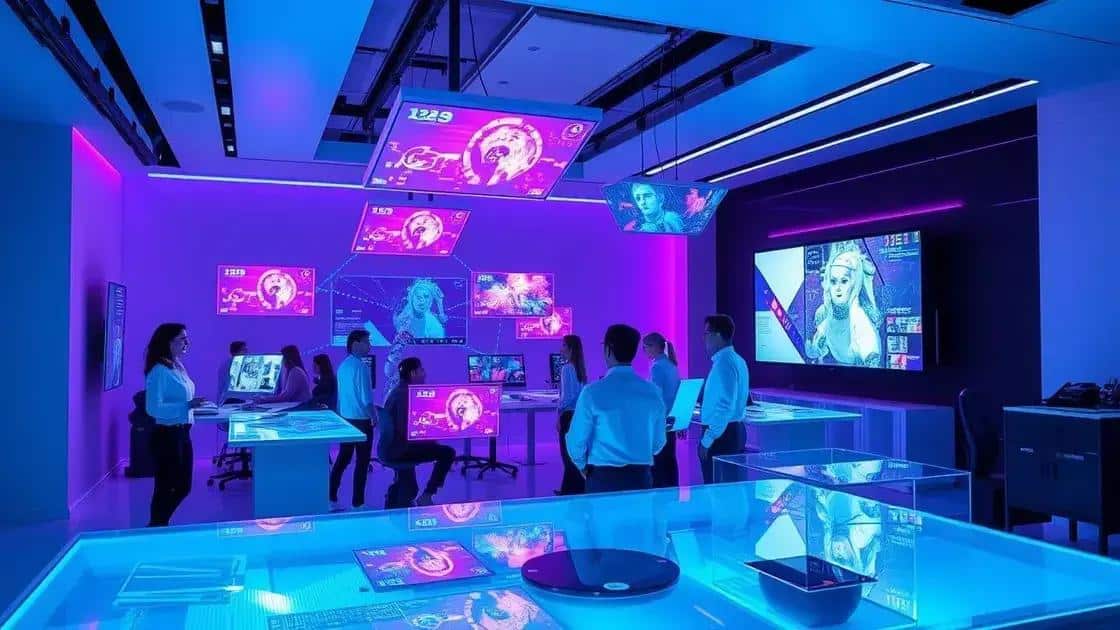AI-generated media trends shaping the future of creativity

AI-generated media trends are reshaping content creation by automating processes, enhancing personalization, and enabling innovative storytelling, thereby transforming how audiences engage with various forms of media.
AI-generated media trends are increasingly influencing the creative landscape. Have you noticed how these technologies are reshaping our interactions with art and storytelling? Let’s dive in and explore this fascinating evolution.
emerging trends in AI-generated media
As we explore the emerging trends in AI-generated media, it becomes clear that technology is pushing creative boundaries. New tools and software are making it easier to produce content that is engaging and visually appealing. These advancements not only save time but enhance creativity as well.
Key Trends to Watch
Several exciting trends are reshaping how media is created and consumed:
- Personalization: AI helps tailor content based on user preferences, providing a unique experience for each viewer.
- Enhanced Visual Effects: With AI, creators can generate stunning visuals that were previously out of reach.
- Automated Content Creation: AI tools can now write articles, generate artwork, and even compose music.
- Interactive Media: AI is paving the way for more interactive and immersive experiences in digital storytelling.
Moreover, the integration of AI-generated media into various industries is increasing. For instance, the film industry uses this technology to create realistic animations and special effects. Similarly, the gaming industry benefits from AI to develop engaging environments and characters. This trend is fundamentally changing how stories are told and experienced.
As these trends evolve, they bring forth challenges and opportunities in equal measure. Addressing ethical concerns around AI-generated content is essential. Transparency in AI’s role in media creation is vital, especially as audiences become more aware of these technologies.
Future Possibilities
The future holds great promise for AI-generated media. Innovations are expected in deep learning algorithms that will produce even more sophisticated content. As we embrace these changes, creativity will blend seamlessly with technology, opening doors to new artistic expressions.
impact of AI on content creation

The impact of AI on content creation is significant and far-reaching. With advancements in technology, creators now have powerful tools to assist in developing high-quality content more efficiently. AI technologies help streamline processes and boost creativity, leading to exciting outcomes.
Transformations in the Creative Process
AI reshapes how content is created across various mediums. For instance, in writing, AI can assist by generating ideas or even drafting articles. This frees up time for creators to focus on polishing and refining their work.
- Content Generation: AI can quickly produce articles, scripts, and marketing content, enabling faster project turnarounds.
- Enhanced Creativity: Tools like AI-driven graphic design programs inspire new concepts and assist in visual storytelling.
- Improved Collaboration: AI can analyze collaborative projects, helping teams work more effectively together.
- Data-Driven Insights: AI analyzes audience behavior to recommend content strategies that resonate with viewers.
The use of AI in content creation also leads to more personalized experiences. By understanding user preferences, AI can tailor content accordingly, ensuring that audiences receive what they find most engaging. This personalization allows brands to build stronger connections with their audience.
Moreover, the ethical implications of AI’s role in content creation must be considered. As technology continues to evolve, creators need to maintain transparency and authenticity. Balancing the use of AI with genuine human creativity will be crucial in keeping the audience engaged and trusting the content they consume.
challenges and ethical considerations
The challenges and ethical considerations surrounding AI-generated media are crucial to understand. As we embrace new technologies, it’s important to address the implications they bring. One major challenge lies in maintaining the balance between creativity and automation.
Understanding the Ethics
Ethical considerations in AI-generated content involve accountability, transparency, and the potential for bias. It’s essential to ask questions like: Who is responsible for the content created by AI? How can we ensure that AI operates fairly and without prejudices?
- Accountability: Determining who is liable when AI creates harmful or misleading content is vital.
- Transparency: Users should know when they interact with AI-generated media to understand its origins.
- Bias and Fairness: AI systems can inadvertently learn and reinforce biases present in the data they are trained on.
- Privacy Concerns: AI often requires vast amounts of data, raising questions about user consent and data protection.
Furthermore, it’s crucial to consider how AI affects creative jobs. While it enhances productivity, there are fears that it may replace human creators in certain areas. This shift can lead to job displacement and affect the livelihoods of many artists and content creators.
As society navigates these challenges, finding a way to leverage AI facilitates creativity while respecting ethical guidelines is essential. Regular discussions and policy updates will help align the use of AI technologies with societal values.
future predictions for AI in media

Future predictions for AI in media suggest a transformative shift in the way content is produced and consumed. As technology continues to evolve, we can expect AI to play an even larger role in shaping various media landscapes.
Innovative Trends to Anticipate
One significant area of growth will be the innovation in automated content creation. As AI tools improve, they will generate more sophisticated articles, videos, and graphic designs that align closely with audience preferences.
- Real-time Content Insights: AI will offer instant analytics that help creators adapt their content strategies based on viewer engagement.
- Augmented Reality Experiences: The use of AI will enhance augmented reality (AR) technologies, making media more interactive and engaging.
- Improved Personalization: AI will analyze individual user data more effectively, leading to highly customized media experiences.
- Seamless Integration: AI will work alongside human creators to enhance creative processes, allowing for collaboration between technology and artistry.
As these advancements unfold, it is essential to consider how they impact traditional roles in media creation. For instance, AI could streamline workflows in newsrooms, helping journalists focus on in-depth reporting and storytelling. This shift may lead to richer content as AI takes on repetitive tasks.
Furthermore, as audiences become more accustomed to AI-generated content, the standards for quality and authenticity will rise. Creators will need to maintain a balance between leveraging AI and preserving the human touch in storytelling. Continuous adaptation will be crucial for staying relevant in a rapidly changing media environment.
The future of AI in media is bright and full of possibilities. As we’ve explored, the impact of AI on content creation is transforming how we engage with various media forms. While challenges and ethical considerations remain, it is clear that AI will be a valuable partner for creators. Looking ahead, embracing these technologies will enable more innovative and personalized experiences for audiences. By balancing human creativity with AI efficiencies, media can continue to evolve and inspire, making the creative process more exciting than ever before.
FAQ – Frequently Asked Questions about AI in Media
How is AI changing content creation?
AI automates various tasks, helping creators generate content faster and allowing them to focus on storytelling and creativity.
What are the ethical considerations of using AI in media?
Key ethical concerns include accountability, transparency, and addressing biases present in AI systems to ensure fair content.
Will AI replace human creators?
While AI can assist in content creation, it is expected to enhance rather than replace human creativity, allowing for collaboration.
What can we expect from the future of AI in media?
The future includes more personalized experiences, innovative content, and improved technology integration, shaping how audiences engage with media.






